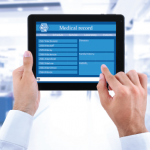
“If you don’t document it, it didn’t happen.” How many times have we all heard this in a conversation or committee meeting, or seen it a memo?
Certainly, this is wise advice, especially in an era when reimbursement depends on the demonstration that a host of items have been performed in the clinical setting: history and physical, review of systems, review of records, complex decision making, and so on. In the realm of education, documentation also abounds and includes needs assessments, written goals and objectives, and disclosure statements, among others.
To meet the requirements for documentation, institutions have acquired computer systems that far exceed in power those that got Apollo 7 to the moon. No doubt about it, modern medicine is equipped to document.
I have a question that is somewhat different. “If you document it, did it happen?”
I am not talking about fraudulently billing for services. I am talking about the real world and the extent to which honest and conscientious people deliver care in the spirit and not just the letter of the law.
Documenting in Action
I began to ask this question while visiting my mother in the hospital. This was a fine, well-established community hospital. Indeed, in the elevator, there was a sign indicating that this hospital was the only one in the area that was ranked in the top 100 by some rating service. I have no idea how this assessment was made, but it is reassuring to know that a loved one is in the hands of good people.
When I was not with my mother, I paced around the ward, which had an old-fashioned nursing station where scores of people were charting, scribbling notes, or clacking at computer keyboards. From the intensity of their activity, they appeared to be documenting up a storm.
On the other hand, there appeared to be only a few people actually with patients, and those who were seemed variously frazzled or frenzied. I watched one nurse in the middle of her 13-hour shift speed around the ward with the moves of Barry Sanders in his prime days with the Detroit Lions. In her white Adidas sneakers, the nurse dodged right near a med cart, broke left past an old man drooling in a wheel chair, and then did a quick scamper down the hall, cutting sharply to enter a patient room. Carmen was her name and she was clearly a great nurse, the kind you love to work with when you are a house officer, especially in the ER.
At one point, Carmen came into my mother’s room to do patient education with a wizened old lady in the next bed. The woman was about to be discharged after a bout of heart failure and Carmen did a terrific job. In about a minute flat, she hit the high points of salt restriction, daily weights, and medication adherence. She then apologized to the patient because there was a code down the hall and her services were urgently needed.
Some time during the course of the shift when the ward settled down, Carmen would no doubt go to the nursing station and spend many minutes or hours documenting what she had done that day. I am positive that the documenting took more time than the doctoring or—in this case—the nursing.
If there is a finite amount of time that can be spent on each patient, what would be the best allocation: documenting care or providing it?
Documenter’s Dilemma
We are living in a time when there are critical shortages in the provision of medical services and a failure to attract and adequately compensate healthcare providers— especially nurses—who do heroic work under very trying circumstances. If there is a finite amount of time that can be spent on each patient, what would be the best allocation: documenting care or providing it?
Fortunately, Carmen’s patient picked up on the essentials on heart failure. Given Carmen’s furious schedule, I wonder what would have happened if the patient had questions about what kind of scale to use or how much salt is in a bag of potato chips. Seeing how Carmen worked, I suspect that she would have returned after the code to explain again and then stayed late to document while her family ate their dinner without her.
In my own practice, I am spending more and more time documenting and less and less time doctoring. The need for rheumatology services grows. There are not enough of us to care for patients or to teach. An increasing amount of time is consumed with writing about what we do and a decreasing amount of time is devoted to doing it. In this onslaught of documentation, I would include obtaining permission from payers to prescribe certain treatments.
During my house staff training, one of my co-interns relayed his experiences on a rotation in the African bush. The time was well before AIDS but malaria and tuberculosus were rampant as were the other parasitic diseases that caused incredible devastation. Suffice it to say, sub-Saharan African did not—and does not—have a lot of money to spend on healthcare, and they could not use precious dollars on medical records.
“How did you know what had happened to the patients?” I asked my friend.
“They wore little wooden amulets around their necks with notations like ‘TB 1968 Rxed with INH,’ ” he said.
“That’s it?”
“What more do you need?” he said, a wise comment I have always remembered.
Bonus Care
The computer hardware and software manufacturers would be bereft if we slowed down on the documentation; informatics is touted as the answer to all that ails modern medicine, and that is their business.
Personally, however, I would like to doctor more and document less and—God forbid—have the regulators trust me that I am delivering the services for which I am billing, even if I do not dot every “i” and cross every “t.”
There is a Southern word, lagniappe, which I always associate with New Orleans and its cuisine. Lagniappe is something extra, a bonus, an embellishment that makes life better.
In their interaction with the healthcare system, patients need lagniappe—a quiet, unhurried conversation with the doctor, a dietician describing how to spice up a low-salt diet with some Texas Pete hot sauce, a nurse washing an old lady’s thin gray hair.
In medicine, what can provide lagniappe?
Doctoring? Absolutely.
Documenting? Get real.
Dr. Pisetsky is physician editor of The Rheumatologist and professor of medicine and immunology at Duke University Medical Center in Durham, N.C.


